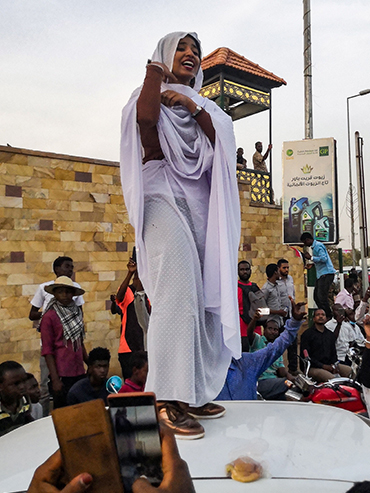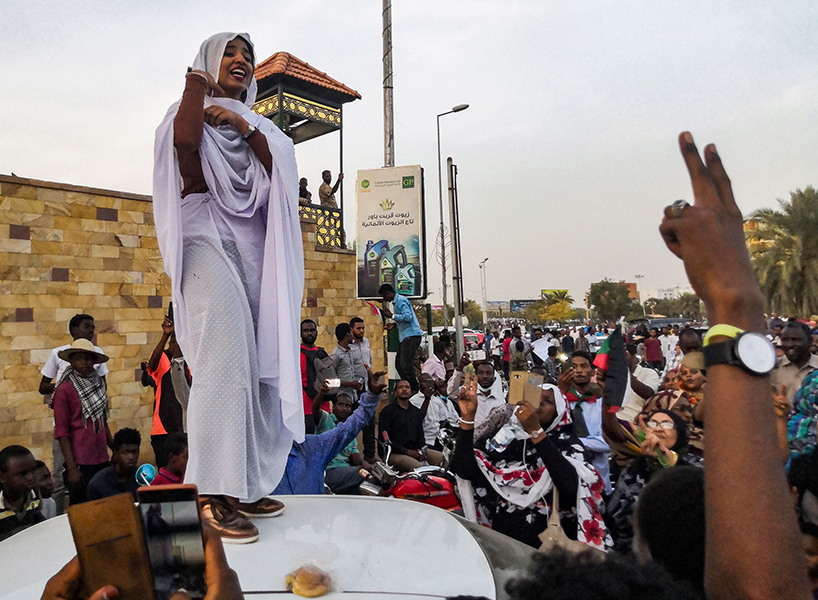Why Do Some International Tragedies Matter More Than Others?
The ongoing crisis in Sudan hasn't captured the public's attention the way the Notre-Dame fire did


When Paris’ famous cathedral, Notre-Dame de Paris, burned on April 15, the world cried—and then raised $1 billion to rebuild it. Weeks later, terrorists bombed three churches throughout Sri Lanka—my homeland—and three luxury hotels in the country’s capital, Colombo. Many of the people I follow on social media posted some variation of #PrayForSriLanka on their feeds, but they moved on quickly. Fundraising efforts attracted only a fraction of the donations that Notre-Dame received. But you know what really hit me where it hurts? When I was finally able to leave my house a week later, very few people I interacted with IRL even knew what the hell had happened.
And now, I’m seeing the same thing all over again, this time about the ongoing crisis in Sudan.
Sure, lots of Twitter users reposted a photo of Sudanese protester Alaa Salah standing atop a car during a protest on April 9. And people have started turning their profile pictures indigo blue to honour Mohamed Mattar, a 26-year-old protester who was killed by Sudanese security forces in June. But as I saw when it was my country that was being ignored, my curated Twitter feed of people that are passionate about the well-being of humanity everywhere doesn’t necessarily translate into my day-to-day reality. It’s painful for me to say this, but not everybody gives a sh-t. In fact, most people don’t.
Some tragedies capture the West’s attention and some just… don’t
This doesn’t mean the people who don’t know or care about Sudan (or Sri Lanka, or Grenfell Tower, or the ongoing persecution of Myanmar’s Rohingya people or the civil war in Yemen) are evil. Our society is becoming increasingly fragmented due to our growing dependency on technology and social media, and that has deeply negative impacts on our capacity for empathy. We require sensationalized stories and simple narratives in order to be moved—and even then, our attention is often fleeting. It doesn’t make me feel amazing to rank one tragedy over the other, but I really do feel that the loss of human lives automatically constitute a bigger tragedy than the loss of a building. That’s why it truly baffles me when outrage and a push for action don’t materialize for certain tragedies or world events.
Maybe I shouldn’t be so surprised, though. According to Kim Christian Schrøder, a Professor of Communication at Roskilde University, “relevance is the paramount driver of news consumption.” That is, for a story to capture the public imagination and maintain its attention, the story needs to directly affect news consumers, be that through their personal lives, the lives of their loved ones, their work, what they do for fun or where they live. Virgil Hawkin’s Stealth Conflicts: How the World’s Worst Violence Is Ignored goes even further, breaking down three primary reasons why this happens. He argues that an issue or event’s political significance, cultural proximity and geographical proximity contributes to its perceived relevance, and how much attention it receives—and all three of those factors are at play here.
Everything really is political
The general population sees stories about large economic powerhouses (think, the U.S, China, Russia) as more relevant than news from the “developing” world. But it’s not just about how important we think some places are compared to others; it’s also what we expect from different places. Some days, it feels like people in “first world” countries—a phrase that is problematic in itself—believe conflict is endemic to countries in their peripheral vision, like Sudan (and Sri Lanka, and Yemen, and Myanmar, and…) simply because of where they are.
I’m convinced this train of thought was birthed by colonialism. There’s a direct line between Western empires historically acquiring and exploiting land—and people—and our current belief that some places are just “primitive” and therefore expected to experience violence. Colonizers positioned their exploitation as a social good; according to them, the goal was to better the people they found, and to show them how to no longer live like “savages.” And this “better than” attitude still impacts our perception of different countries today. (It’s also important to remember that this dynamic plays out right here at home, with Canadian POC—and with the Indigenous peoples that inhabited this land well before any of us got here.)
Geographic and cultural “closeness” counts for a lot here
Hawkins also argues that culturally identifying with someone adds to their relevance in our lives. This is where geographical proximity comes into play. Here’s something to think about: about ten years ago, the Sri Lankan government bombed the last no-fire zone left and killed thousands of my people. At the time, the Tamil people in the Greater Toronto Area blocked the Gardiner, a major highway, to protest this massacre and… nothing happened. The larger Canadian community didn’t become more sympathetic to what was happening in Sri Lanka. They didn’t start calling their politicians or speaking out publicly about what was going on.
Now, Hawkins also argues that complication is a deciding factor in how much attention an issue receives. So, maybe people find it hard to sympathize when they don’t have enough background knowledge about a conflict—and they feel overwhelmed by the idea of learning about a complex political issue, so they don’t seek out more information. But I think race also plays a huge role here. These horrific incidents are happening to people that are very different from us, living lives that feel as if they are worlds away, and in countries that aren’t in our line of sight. So, it’s difficult for people to feel connected, and without connection, the outrage that these incidents should be prompting just doesn’t happen.
But we *should* care
I get that it’s difficult to sympathize while navigating a fragmented and extremely compartmentalized reality. And I get that, as a result, people may need a clear bad guy and good guy narrative to “get it.” But we live in a time when information is so accessible—how can we really not know what’s happening elsewhere in the world? And once we know, how can we not act?
I used to wonder why people would look at me like I was out of my mind when I would share my life experiences with them. Like, when they’d share their mothers’ anecdotes of their pregnancies, I’d share that when my mother was pregnant with me, she was also fleeing a genocide and hiding in a freaking jungle eating tree bark and whatever other random things she could find. Or they’d tell me how they were born here, in the True North strong and free, and I’d share that when we finally got on our flight out of the refugee camp, all I ate was grapes because they tasted like juicy popping candies and everything else tasted like paper to me. They were visibly shocked and probably confused. But I was confused, too. Did they really think that everyone lived like them?
But people only know what they know, and that’s something that won’t change unless they put themselves in the position to learn. So here’s my challenge to you: Stop. Read more. Learn.
Related:
As an Indigenous Woman, I Was Triggered By the MMIWG Report
Anti-Immigrant Sentiment Isn’t Just an American Problem
If It Feels Like Racism In Canada Is Getting Worse, That’s Because It Is








